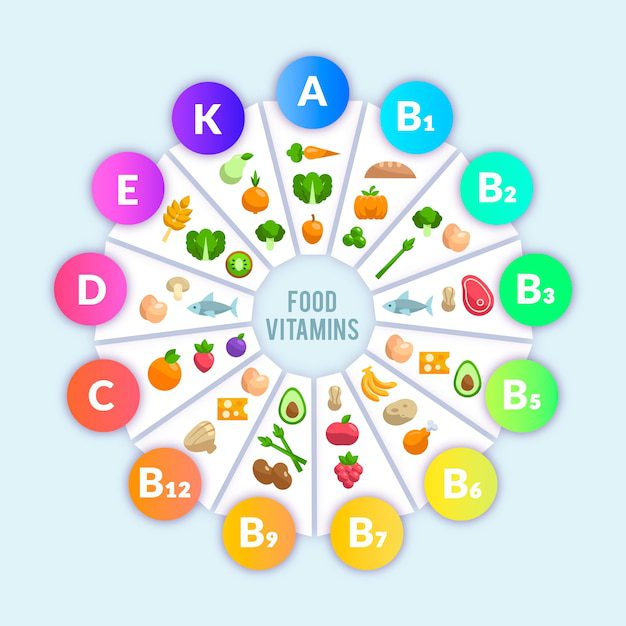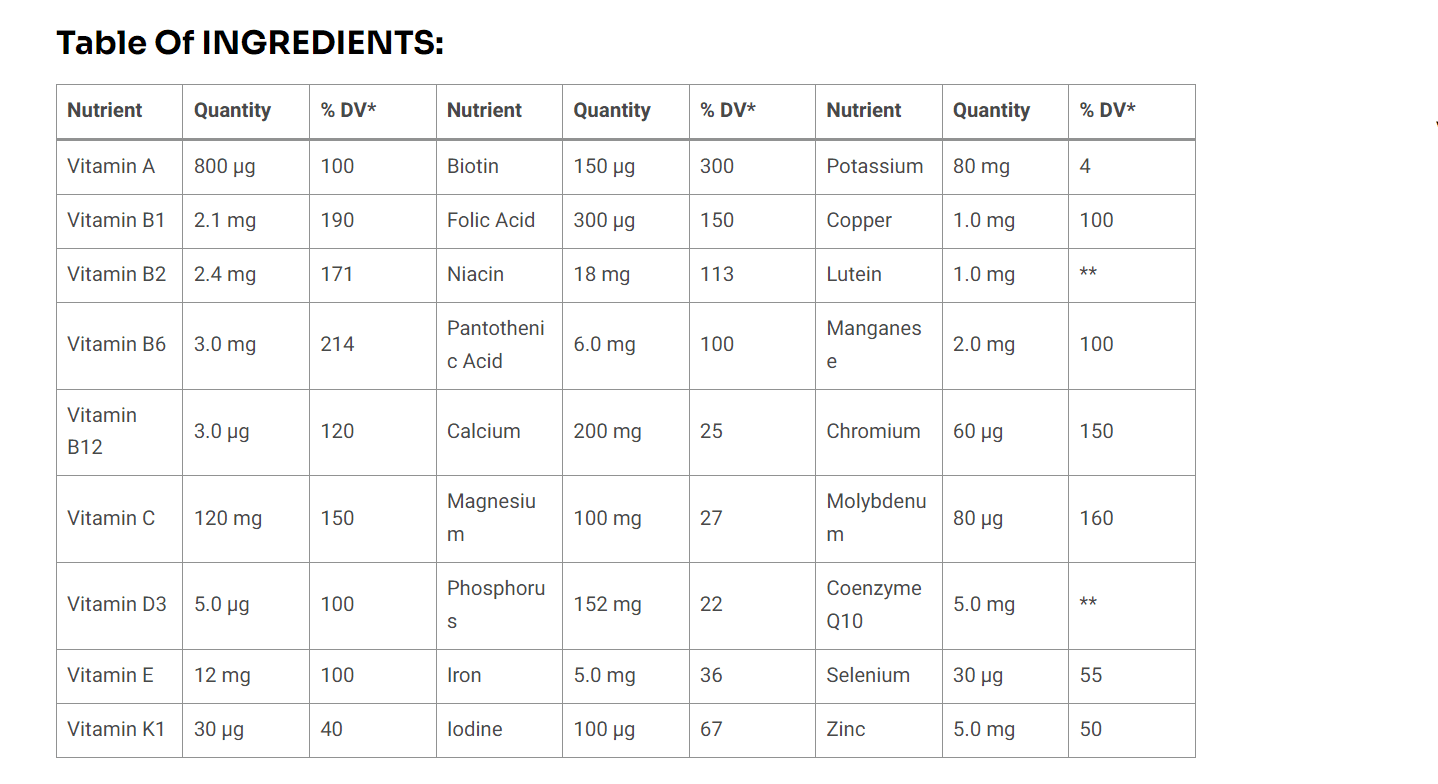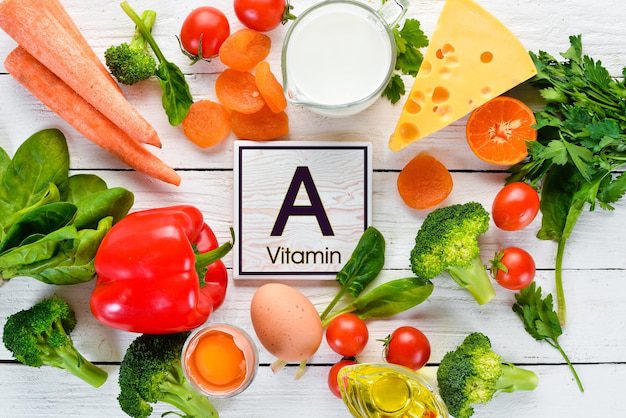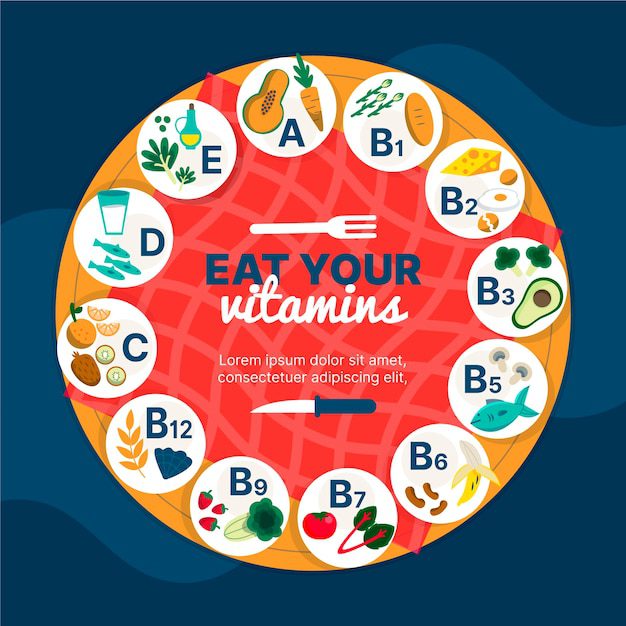A Comprehensive Guide About Vitamini A-Z:
- Vitamine A is a complex multivitamin product, including all the vitamins essential for the human body. In addition to vitamins, this product also includes folic acid, Zinc, Biotin iron, etc. Vitamin A-Z is a complex and multivitamin product. It contains all the vitamins that are necessary for the human body.They ensure our overall health and well-being.This article will explore each vitamin individually, providing an overall understanding of its functions, sources, benefits, and potential risks. So, let’s dive into vitamins and uncover their importance in maintaining a healthy life.Vitamins B6 and B12, Niacin, Folic Acid, and Iron can all help reduce tiredness.
- Vitamins B1, B2, B6, iron, B12, and magnesium contribute to the normal functioning of the metabolism that provides energy.
- Vitamin A and zinc are good for the skin and contribute to maintaining normal skin.

- Please keep in mind that some values are expressed in micrograms (ug) and milligrams (mg), with “% Daily Value” representing the percentage of recommended daily intake based on a standard 2,000-calorie diet. ** Symbols likely indicate there is no established %DV for such nutrients.
-
Components Of Vitamini A-Z
- You can obtain vitamin A from both animal and plant sources. Some common sources are:
- Animal Sources: Liver, eggs, and dairy products.
- Plant Sources: Carrots, sweet potatoes, spinach, and kale.
- Vitamin A is a fat-soluble vitamin. It is generally present in many types of foods. Vitamin A plays an important role in various functions. It plays an important role in:
- It is well known for its role in maintaining healthy vision.
- It plays its role in cell repair.
- It plays its role in the production of energy.
- In skin beauty.
- Sometimes, it acts as a detoxcificant agent.
Sources of Vitamin A

Sources of Vitamin A
-
Benefits of Vitamin A
- You can obtain vitamin A from both animal and plant sources. Some common sources are:
- Vitamin A offers several benefits:
- Vision: It helps maintain good eyesight, especially in low-light conditions.
- Immunity: Supports a robust immune system.
- Skin Health: Promotes healthy skin by aiding cell production and repair.
Vitamin B Complex
Vitamin B complex comprises a group of eight distinct vitamins, each with its unique properties and functions. These vitamins are essential for metabolism, energy production, and maintaining a healthy nervous system.

Vitamin B Complex - Vitamin B1 (Thiamine): Essential for energy metabolism.
- Vitamin B2 (Riboflavin): Supports cell growth and red blood cell production.
- Vitamin B3 (Niacin): Important for DNA repair and metabolism.
- Vitamin B5 (Pantothenic Acid): Plays a role in fatty acid synthesis.
- Vitamin B6 (Pyridoxine): Needed for brain development and function.
- Vitamin B7 (Biotin): Aids in maintaining healthy skin and hair.
- Vitamin B9 (Folate): Crucial for DNA synthesis and repair.
- Vitamin B12 (Cobalamin): Essential for nerve function and red blood cell formation.
Now we shall go into the depth of individual vitamins one by one:
Vitamin B1:
As mentioned above, it is also known as Thiamine and Vitamin B. It plays its role in various body functions. Some of these are given below:
- It is essential for energy metabolism.
- Essential for the proper functioning of the nervous system.
- Involved in the growth and maintenance of cells.
- Important for the proper functioning of the heart muscles.
- It is an antioxidant.
- Play its role in the production of Hydro hydrochloric acid (HCl) in the stomach, which is necessary for digestion.
Vitamin B2:
Vitamin B₂ is another name for Riboflavin. It is found in some food fruits and sold as a dietary supplement. Coenzyme A (CoA) is combined with two coenzymes – flavin, a mononucleotide, and flavin adenine, a dinucleotide. It plays a vital role in the following body functions:
- Energy Production.
- Iron Metabolism.
- Metabolism of Other B Vitamins.
- Growth and Development.
- Vitamin B2 is essential for the proper functioning of the nervous system.
- Antioxidant Defense.
- Red Blood Cell Formation.
- In the synthesis of Hormones
- Act as antioxidant defense
Vitamin B3 (Niacin)
It is a crucial nutrient with several essential functions in the body. Here are the functions of vitamin B3 :
- Anti-Inflammatory Properties
- Niacin can improve the health of the skin by promoting proper circulation and reducing inflammation
- It is known for its role in regulating blood lipid levels
- Involved in cell signaling processes
- Involved in DNA Repair
- Energy Production
Vitamin B5 (Pantothenic Acid)
Vitamin B5 is an essential nutrient with several important functions in the body:
- Vitamin B5 may support wound healing
- It is known for its potential role in promoting healthy skin
- Detoxification
- Involved in the synthesis of cholesterol
- Vitamin B5 is necessary for the synthesis of fatty acids
Vitamin B6:
Vitamin B6 is known as pyridoxine. Vitamin B6 is a water-soluble vitamin. It plays a vital role in the human body. It controls and maintains the various metabolic processes and is essential for health. Here is the functioning and role of Vitamin B6 :
- Hemoglobin Production
- Brain Development and Function
- Maintenance of the Skin Health
- Support the Immune System
- Act as the coenzyme in Enzyme Function
- Maintain the Heart Health
- Growth and Development
- Maintenance of Connective Tissues
- Iron Metabolism
Vitamin B7 (Biotin)
It is a water-soluble B vitamin that plays several essential roles in the body, including:
- Plays a role in regulating gene expression.
- Necessary for cell growth and repair processes.
- It is often associated with promoting healthy skin, hair, and nails.
- Metabolism of Carbohydrates, Fats, and Proteins.
Vitamin B9 (Folate)
It is also a water-soluble B vitamin with several essential functions in the body, including:
- Involved in a group of chemical reactions known as methylation.
- Necessary for the production of red blood cells.
- Crucial for the synthesis and repair of DNA.
Vitamin B12(Cobalamin)
Cobalamin is another name for Vitamin B12. It is a water-soluble vitamin. Vitamin B12 plays a critical role in vital body functions. Here are some important roles of Vitamin B12 are given as follows:
- Red Blood Cell Formation
- Role in Brain Health and Cognitive Function
- Homocysteine Regulation
- Role in Cell Division and Growth
- Maintain Bone Health.
Vitamin C
Vitamin C is also known as the ascorbic acid. Present in the many sour fruits such as lemons oranges. Here is some important functioning of vitamin C.
- Protection from Antioxidant
- Synthesis of Collagen
- Supports our Immune System
- Wound Healing
- Iron Absorption
- Cardiovascular Health
- Vitamin C has anti-inflammatory effects and can help reduce inflammation in the body.
- Act as a natural antihistamine
- Involved in the synthesis of neurotransmitters.
Sources of Vitamin C
Common sources of vitamin C include:
- Citrus Fruits: Oranges, lemons, and grapefruits.
- Berries: Strawberries, blueberries, and raspberries.
- Vegetables: Bell peppers, broccoli, and spinach.
Benefits of Vitamin C
Vitamin C offers a wide range of health benefits:
- Immune Support: It boosts the immune system, reducing the risk of infections.
- Skin Health: Promotes collagen production for healthy skin.
- Antioxidant Properties: Helps protect cells from damage by free radicals.
Vitamin D3:

Vitamin D3 is a fat soluble vitamin. It is present in many foods and fruits. It helps in the absorption of food in the human intestine. These are some important functions of Vitamin D3:
- Vitamin D3 is involved in the regulation of cell growth and differentiation.
- Cardiovascular Health.
- Muscle Function.
- It plays a crucial role in bone formation.
- Vitamin D3 is essential for the absorption of calcium in the intestines.
Sources of Vitamin D3:
- The most natural source of vitamin D3 is sunlight.
- Fatty fish like salmon, mackerel, and trout are excellent dietary sources of vitamin D3.
- Egg yolks contain small amounts of vitamin D3.
Benefits of Vitamin D3:
- Vitamin D3 is essential for the absorption of calcium in the intestines.

- Vitamin D3 plays a role in mood regulation.
- Cardiovascular Health.
Vitamin E
Vitamin E is an important antioxidant. It is present in beauty creams, lotions, and other beauty products. These are some functions of Vitamin E:
- Protection against Antioxidant.
- Cell Membrane Integrity.
- Skin Health.
- Heart Health.
- Evidence suggests that vitamin E may have a protective effect on brain cells.
- Vitamin E can aid in the healing of wounds.
- Vitamin E is involved in the production of red blood cells.
Sources of Vitamin E:
- Green Leafy Vegetables: Spinach, kale, and Swiss chard are leafy greens containing vitamin E.
- Fish: Fatty fish like salmon and trout contain vitamin E.
- Vegetable Oils: Vegetable oils like wheat germ oil, sunflower oil, safflower oil, and olive oil contain vitamin E.
- Nuts and Seeds: Almonds, sunflower seeds, hazelnuts, and pine nuts are rich sources of vitamin E.
- Vitamin E supports the immune system’s function.
Benefits:
- Vitamin E is a potent antioxidant, helping neutralize free radicals in the body.
- Wound Healing.
Vitamin K
It is a fat soluble vitamin. It is used for the normal functioning. Other functions are given below:
- Blood Clotting.
- Bone Health.
- Calcium Regulation.
- Heart Health.
Sources of Vitamin K
You can find vitamin K in:
- Leafy Greens: Kale, spinach, and collard greens.
- Dairy Products: Cheese and yogurt.
- Fermented Foods: Natto and sauerkraut.
Benefits of Vitamin K
- Blood Clotting: Essential for proper blood clot formation.
- Bone Health: It may help reduce the risk of fractures.
- Heart Health: May promote cardiovascular health.
Side Effects Of The Vitamin A-Z:
In addition to so many benefits, Vitamin A-Z also contains some side effects. The important side effects are given below:
Allergic Sensitivities:
Certain individuals suffer from allergies that cause rashes and itching in various parts of their bodies. These allergies can often be treated simply by avoiding medication and taking preventive steps against future flare-ups.
Overconsumption Risk:
Some individuals exceed the amount stated on a bottle’s dosage recommendations, which results in overconsumption of vitamins. Excessive vitamin consumption can cause various issues within the human body – most importantly, kidney stones if taken extensively at high rates.
Medication Interactions:
Certain medicines can interact with each other when taken by patients. Gastrointestinal Response Excessive consumption of vitamins may irritate the gastrovascular cavity and result in digestive discomfort for humans.
-
FAQs
Can we use a to Z tablet daily?
Using an “A to Z” multivitamin tablet daily without a specific medical need is not recommended. Consult a healthcare professional for personalized guidance.
Can I get all my vitamins from food, or should I take supplements?
Ideally, you should obtain vitamins from a balanced diet. However, supplements can be beneficial if you have specific deficiencies.
Are there any risks associated with excessive vitamin intake?
Yes, some vitamins can be harmful in excess. For instance, too much vitamin A can lead to toxicity.
Is it possible to get all vitamins from a vegetarian or vegan diet?
With careful planning, a vegetarian or vegan diet can provide all the necessary vitamins. Supplements may still be needed in some cases.
Can vitamins cure illnesses?
Vitamins play a supportive role in health, but they are not a replacement for medical treatment. Consult a healthcare professional for any medical concerns.
What happens if I don’t get enough vitamins?
Vitamin deficiencies can lead to various health issues, ranging from fatigue to more severe conditions. Maintaining a balanced diet is essential.
How can I ensure my children get the right vitamins?
Encourage a balanced diet with plenty of fruits, vegetables, and whole grains. Consult a doctor.
-
Conclusion:
In short Vitamini A-Z is a supplement medication. It contains the various vitamins and minerals which are very essential for the body function. Over dose of vitamini A-Z may leads to the various side effect. If it is necessary to consult with a doctor then don’t waste your time and consult with a doctor. That was all about ”
- Vitamine A is a complex multivitamin product, including all the vitamins essential for the human body. In addition to vitamins, this product also includes folic acid, Zinc, Biotin iron, etc. “




